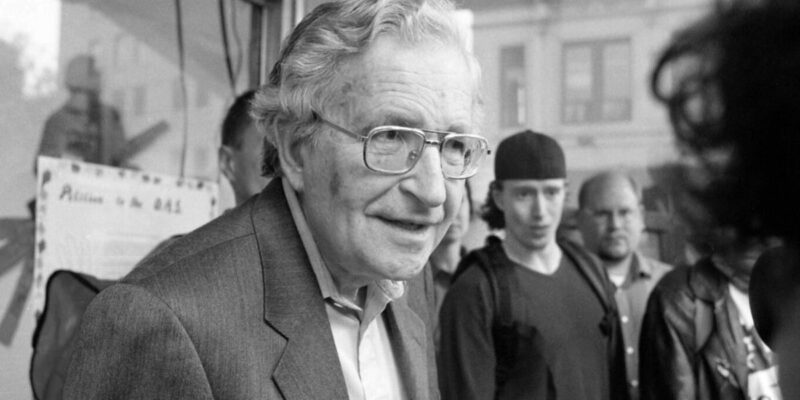
Illegitimate Authority: Facing the Challenges of Our Time
by Noam Chomsky, edited by C.J. Polychroniou
Haymarket Books, 2023; x + 330 pp.
Noam Chomsky is universally respected for his contributions to linguistics and to the philosophy of mind, but he is a “public intellectual” as well, and it is in the public arena that opinion about him is divided. Illegitimate Authority is a collection of thirty-four interviews of him by C.J. Polychroniou, the book’s editor, and the economist Robert Pollin, and reading it makes clear why people react strongly to Chomsky’s opinions. He speaks with supreme self-confidence, and if you disagree with him, you are likely to turn away angrily. I often felt like doing this while reading the book, but nevertheless what he says is often insightful. In brief, Chomsky is better on foreign policy than on the economy.
He rightly deplores crony capitalism, the use by big business of state-granted privileges to gain wealth. By no means, though, does he call for the state to get out of the economy. To the contrary, he argues that the free market could not function at all without an interventionist state:
The masters of mankind have always understood that free-market capitalism would destroy them and the societies they owned. Accordingly, they have always called for a powerful state to protect them from the ravages of the market, leaving the less fortunate exposed. That has been dramatically plain in the course of the “bailout economy” of the past forty years of class war, masked under “free market” rhetoric.
If you ask why he thinks that the free market must be unstable, a surprising fact emerges. He offers no defense of this view at all. If challenged, Chomsky would doubtless cite many “progressive” economists who agree with him, along with an abundance of facts and figures; but there would be no rigorous argument that capitalism must break down. This approach is in marked contrast to that of his work in linguistics, which is based on theoretical considerations that are clearly set forward. In questions of public affairs, Chomsky proceeds by trying to overwhelm people with facts, or supposed facts, drawing on his wide reading and capacious memory.
He is aware of Ludwig von Mises, but he offers no response to Mises’s demonstration that the free market is the only workable system of social cooperation. Incredibly, he regards Mises as the father of “neoliberalism,” Chomsky’s name for crony capitalism. He calls Mises “the revered founder of the neoliberal movement that has reigned for the past forty years.” We learn that the “core features of the reigning state capitalist institutions have been exacerbated by the rot spreading from interwar Vienna, adopting the term ‘neoliberalism’ in the international Walter Lippmann symposium in Paris in 1938, then in the Mont Pelerin society.” He presents the standard distortion of Mises’s comments on Italian fascism in Liberalism (1927); for an account of what Mises meant, see my “Mises and Fascism.”
As I mentioned earlier, though, Chomsky is much better on foreign policy. His strongest point is his resolute opposition to war. He recognizes the role of what Murray Rothbard called “court intellectuals” in fomenting the war spirit:
A few years later, in 1916, Woodrow Wilson was elected president with the slogan “Peace without Victory.” That was quickly transmuted to Victory without Peace. A flood of war myths quickly turned a pacifist population to one consumed with hatred for all things German. The propaganda first emanated from the British Ministry of Information . . . American intellectuals of the liberal [John] Dewey circle lapped it up enthusiastically, declaring themselves to be the leaders of the campaign to liberate the world. For the first time in history, they soberly explained, war was not initiated by military or political elites, but by the thoughtful intellectuals—them—who had carefully studied the situation and, after careful deliberation, rationally determined the right course of action: to enter the war, to bring liberty and freedom to the world, and to end the Hun atrocities concocted by the British Ministry of Information.
In the present thermonuclear age, when wars have the potential to destroy life on earth, it has become even more imperative than at the time of the world wars, with all their appalling horrors, to seek peace. Chomsky cannot be deemed a partisan of Vladimir Putin, whom he deems a war criminal, but he firmly rejects the policy of massive arms shipments to Ukraine by the United States. This policy has resulted in a proxy war between Russia and America that might escalate into nuclear war, and to prevent this ultimate disaster, we must seek compromise, Chomsky asserts.
He notes that Graham Allison, an outstanding authority who strongly opposes Putin, recognizes this necessity:
A diplomatic settlement must offer Putin some kind of escape hatch—what is now disdainfully called an “off-ramp” or “appeasement” by those who prefer to prolong the war. That much is understood even by the most dedicated Russia-haters, at least those who can entertain some thought in their minds beyond punishing the reviled enemy. One prominent example is the distinguished foreign policy Graham Allison of Harvard University’s Kennedy School of Government, who also has long direct experience in military affairs . . . few can doubt that Putin is a “demon” radically unlike any US leader, who at worst only makes mistakes, in [Allison’s] view. Yet even Allison argues that we must contain our righteous anger and bring the war to a quick end by diplomatic means. The reason is that if the mad demon “is forced to choose between losing and escalating the level of violence and destruction, then, if he’s a rational actor, he’s going to choose the latter”—and we may all be dead, not just Ukrainians.
Can anything be done by those of us outside the government to promote peace? Chomsky offers a helpful suggestion, and here he again echoes Rothbard. He notes that government ultimately rests on public opinion; if this turns against a war, the government may feel irresistible pressure to change its course:
In one of the first works in what is now called political science, 350 years ago, his “First Principles of Government,” David Hume wrote that
. . . . We shall find that, as Force is always on the side of the governed, the governors have nothing to support them but opinion. It is, therefore, on opinion only that government is founded; and this maxim extends to the most despotic and most military governments, as well as the most free and most popular.”
If this is right, a determined campaign for peace has a good chance of achieving its aims—if it wins over the public.
Those who read Illegitimate Authority will need to sort out the good ideas from the nonsense in the book. There is plenty of both.








